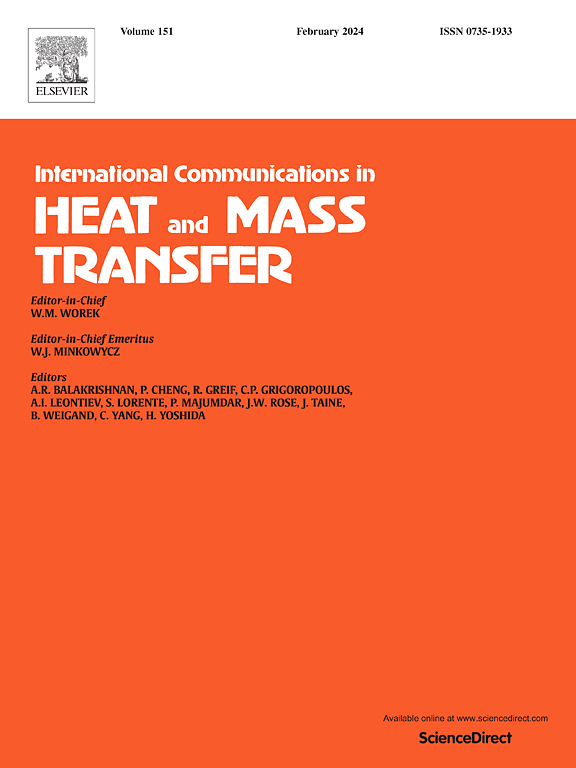基于非平衡膜理论和各向同性混合物降解机理的新型凝结传热修正方法
IF 6.4
2区 工程技术
Q1 MECHANICS
International Communications in Heat and Mass Transfer
Pub Date : 2024-11-18
DOI:10.1016/j.icheatmasstransfer.2024.108342
引用次数: 0
摘要
使用各向同性混合物进行基于热力学循环的能量转换是在碳中和背景下推进全球低碳发展的有效战略。然而,现有传热混合物模型的缺陷和各向同性制冷剂复杂的冷凝机制给热交换器的尺寸设计和优化带来了巨大挑战,会直接影响热动力循环系统的经济效益和运行安全。因此,迫切需要一种包含混合效应的简化通用修正方法,以提高传统模型的预测精度。本研究建立并验证了基于膜理论的非平衡冷凝传热模型,以分析各种参数对水平圆管内各向同性混合物传热降解和传热系数的影响。通过多因素敏感性分析和无量纲方法,提出了表征传热退化梯度贡献的退化因子。根据提出的因子,开发了一个考虑混合效应的简化非平衡模型,无需进行复杂计算。利用新开发的非平衡模型,对包含 1813 个实验点的数据库进行了预测。预测值与实验值之间的偏差为 15.7%,与现有的混合物模型相比,显示出显著的预测准确性和可推广性。将这种校正方法扩展到各种纯物质模型后,准确性有了显著提高。本文章由计算机程序翻译,如有差异,请以英文原文为准。
A novel condensation heat transfer correction based on non-equilibrium film theory and degradation mechanism for zeotropic mixture
Energy conversion based on thermodynamic cycle using zeotropic mixtures is an effective strategy for advancing global low-carbon development in the context of carbon neutrality. However, the deficiencies of existing heat transfer mixtures models and the complex condensation mechanisms of zeotropic refrigerants pose significant challenges to the size design and optimization of heat exchangers, which can directly impact the economic efficiency and operational safety of thermodynamic cycle systems. Thus, there is an urgent need for a simplified and universal correction method that incorporates mixing effects to improve prediction accuracy of conventional models. In the present study, a non-equilibrium condensation heat transfer model based on film theory was developed and validated to analyze the influence of various parameters on heat transfer degradation and heat transfer coefficients of zeotropic mixtures inside horizontal circular tubes. Through multi-factor sensitivity analysis and dimensionless method, a degradation factor characterizing the gradient contributions to heat transfer degradation was proposed. Based on the proposed factor, a simplified non-equilibrium model considering mixing effect without complex computations was developed. Using the new developed non-equilibrium model, prediction of a database containing 1813 experimental points was conducted. A deviation of 15.7 % between the predicted values and the experimental values was achieved, demonstrating remarkable predictive accuracy and significant generalizability compared to existing mixture models. Extending this corrective method to various pure substance models resulted in a significant improvement in accuracy.
求助全文
通过发布文献求助,成功后即可免费获取论文全文。
去求助
来源期刊
CiteScore
11.00
自引率
10.00%
发文量
648
审稿时长
32 days
期刊介绍:
International Communications in Heat and Mass Transfer serves as a world forum for the rapid dissemination of new ideas, new measurement techniques, preliminary findings of ongoing investigations, discussions, and criticisms in the field of heat and mass transfer. Two types of manuscript will be considered for publication: communications (short reports of new work or discussions of work which has already been published) and summaries (abstracts of reports, theses or manuscripts which are too long for publication in full). Together with its companion publication, International Journal of Heat and Mass Transfer, with which it shares the same Board of Editors, this journal is read by research workers and engineers throughout the world.

 求助内容:
求助内容: 应助结果提醒方式:
应助结果提醒方式:


